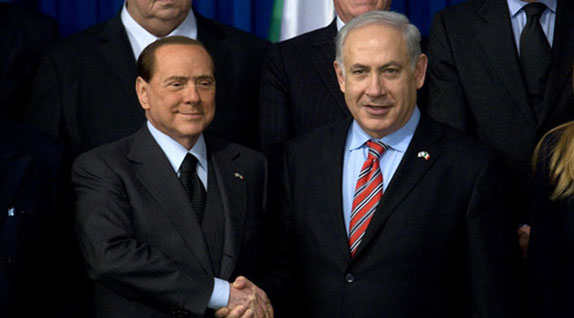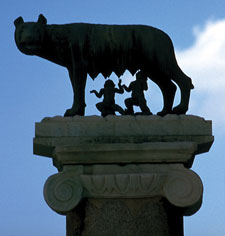 David Furst/AFP/Getty Images
David Furst/AFP/Getty Images
Article
As the European Union plays a more prominent role in Middle East peace talks, what effect will it have on Israel?
Learn the why behind the headlines.
Subscribe to the Real Truth for FREE news and analysis.
Subscribe NowItalian Prime Minister Silvio Berlusconi met with Israel’s Prime Minister Benjamin Netanyahu to tighten Italian-Israeli ties, with Mr. Berlusconi revealing his hope that Israel may someday join the European Union.
During the three-day visit, the two leaders signed nine agreements on issues such as energy, environment, economic cooperation and health. Both sides expressed deep respect and interest in each other’s countries and goals.
In his welcoming comments, Mr. Netanyahu said, “I can think of few peoples who have contributed more to Western civilization than our two peoples. In both Rome and in Jerusalem, the foundations of Western culture were laid. That is why it is vital that Italy and Israel stand side by side, proud of our heritage, committed to our values, and determined to defend our future and our culture.”
Prime Minister Berlusconi said that due to Italy’s close relationship with Israel, he considers Israel “one of the European countries.”
He affirmed his commitment to the country by stating that “as long as I am one of the shapers of politics, my greatest dream is to include Israel among the European Union countries.”
While visiting sites in Israel, Mr. Berlusconi said that his government would not ignore threats against the Middle Eastern nation. “We will not close our eyes before a state that wishes to destroy a country that is our friend,” he said in an apparent reference to Iran.
Mr. Berlusconi also met with Palestinian President Mahmoud Abbas. In Bethlehem, he addressed the suffering of the Palestinian people, saying, “…just as it’s right to cry for the victims of the Shoah [the Hebrew term for the Holocaust], it’s right to show pain for what happened in Gaza.”
During Mr. Berlusconi’s Israeli tour, German Chancellor Angela Merkel met with Israeli President Shimon Peres in Berlin, demonstrating the EU’s increased interest in the Middle East peace process.
At a January 2010 United Nations Security Council forum, an EU official statement advocated a two-state solution for Israel and Palestine.
“If there is to be a genuine peace, a way must be found through negotiations to resolve the status of Jerusalem as the future capital of two States. The EU calls for the reopening of Palestinian institutions in Jerusalem in accordance with the Roadmap [to peace].” It maintained that “the EU stands ready to contribute substantially to post-conflict arrangements, aimed at ensuring the sustainability of peace agreements.”
Commentator Ghassan Michel Rubeiz, writing for Common Ground News Service, a non-profit initiative for a peaceful resolution to the Middle East conflict, proposed a future role for EU security forces in the region: “Over the years, Europe’s role as a mediator receded, giving way to an expanding US role in the region. But in more recent decades, European states have achieved excellence in policing peace in many places: in the Middle East, the Balkans, West Africa and elsewhere. Given the opportunity, Europe could provide the Israelis and Palestinians with the necessary international security that is crucial for enforcing a two-state solution.”
While the futures of Europe and Israel are intertwined, they will follow very different paths.
- Real Truth Magazine Articles
- EUROPE
 Out of the Ashes – The Rise of Europe – Part 1
Out of the Ashes – The Rise of Europe – Part 1
More on Related Topics:
- The Last U.S.-Russian Nuclear Pact Is About to Expire, Ending a Half-Century of Arms Control
- Explainer: What Is President Trump’s ‘Board of Peace’ and Who Has Joined So Far?
- China and Japan, Uneasy Neighbors in East Asia, Are at Odds Again
- Is Peace in Ukraine Any Closer After Trump-Zelenskyy Talks?
- Explainer: Why Is Fate of Donetsk Region a Sticking Point in Talks on Ending War in Ukraine?


